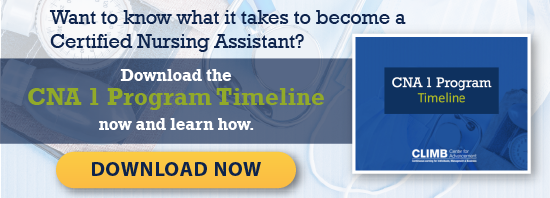 The choice to become a CNA is an important one that shouldn’t be taken lightly. It requires a patient, compassionate, and dedicated person to successfully walk the CNA path. Unfortunately, there are several myths about the profession that a potential CNA should be aware of. This article will seek to debunk five of the most commonly held myths. But first, let’s learn more about what a CNA is and what is involved in becoming one.
The choice to become a CNA is an important one that shouldn’t be taken lightly. It requires a patient, compassionate, and dedicated person to successfully walk the CNA path. Unfortunately, there are several myths about the profession that a potential CNA should be aware of. This article will seek to debunk five of the most commonly held myths. But first, let’s learn more about what a CNA is and what is involved in becoming one.
What is a Certified Nursing Assistant (CNA)?
A certified nursing assistant (CNA) is a member of a health care team — under the direction of a licensed nurse — who assists nurses. Only licensed nurses can delegate duties to a CNA. This is a federal and state mandate. CNAs work in various health care settings. Some of the daily tasks include: taking vital signs, height and weight measurements, blood pressure, assisting with bathing, dressing, toileting, and other daily care needs that an individual cannot do alone. CNAs do not do “nursing,” but instead they assist nurses.
Becoming a CNA
A CNA student enrolls in a state accredited CNA training program, and must complete a state board exam after completing the training program. Clinical hours and hands-on training are required for a CNA career. A state accredited program will typically provide hours and training toward the certification.
4 CNA Myths Debunked
Myth #1: CNAs Can Only Work in Nursing Homes/Skilled Nursing Facilities
A CNA career has many opportunities and choices and is not limited to nursing homes or a SNF(skilled nursing facility), though those are great choices for a CNA career path. A CNA can also work in a hospital, medical center, doctors’ offices, medical clinics, urgent care facilities, and home health, among other options.
A reason for myth #1 — a CNA can only work in a nursing home — is because nursing homes and SNFs are required by Federal law to hire CNAs, whereas other health care facilities are not required by law to hire CNAs. They hire CNAs by choice.
Myth #2: CNA is a Dead End Job
As a CNA student or professional, you most likely came to this field equipped with a heart of compassion and service and a desire to help those with medical and daily living needs. As a CNA, you are exposed to a variety of medical professionals and environments that may pique your interest. You may decide to further your education and use your CNA job as a bridge to nursing school/a nursing career, a move into a management position, or you may even decide to apply to medical school or a physician assistant (PA) program.
Fortunately this myth couldn’t be further from the truth. Being a CNA is just the beginning of many career opportunities and may just be the start you are looking for.
Myth #3: CNAs Only Do the Grunt Work
While CNAs perform daily tasks for patients in a nursing environment, they are also an invaluable asset to nurses as they act as their eyes and ears. CNAs maintain caring relationships with patients and are directly involved with daily patient care. Consequently, they are able to identify and triage problems early on, ensuring exceptional patient care.
Myth #4: The Nursing Assisting Shortage Guarantees Work
While there is a shortage of nursing professionals nationwide, that does not automatically guarantee the perfect job when your training is complete. Along with thorough and reputable training, you will still need to have relevant experience, a strong resume, and proper certifications to compete with the best. Also, there are a variety of healthcare settings, niches, and markets with very different needs, which will require flexibility on your part to find that perfect job.
Debunking these common misconceptions about CNAs will hopefully shed more light on a career path that can provide its participants with a wealth of opportunities. The training and certification are rigorous; however, the career opportunities are numerous and the reward that comes with direct patient care is invaluable.




